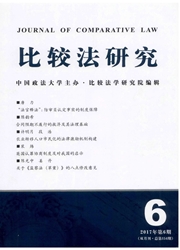

 中文摘要:
中文摘要:
过失的体系性定位经历了一个从罪责阶层转移到构成要件阶层的过程,其中个人预见可能性一直被视为罪责要件。通说认为过失犯无主观构成要件,但是,欠缺过失主观不法的行为,在罪责非难的正当性上遭遇了理论的困境。目的行为论无法得出圆满的解决方案,因此,只有采纳过失的个别化理论,将个人预见可能性从罪责阶层中释放出来,在构成要件阶层中规范地说明过失的主观不法。个别论理论背后所体现的是罪责的客观化这一趋势,对此需要慎重对待,功能责任论的提出,在责任判断一般化的基础上,有其价值,但是仍然难以回避意志自由,否则不法与责任将难以区分。法规范只有对有能力履行义务的行为人才能提出要求,个人能力是架构过失不法的要素。
 英文摘要:
英文摘要:
Although the systematic position of negligence has experienced a shift from the stage of liability to the stage of the constitutive element,the individual possibility- foreseen has always been treated as an element of liability. According to the dominant view,negligence crime has no subjective constitutive element,which leads to a dilemma,the justifiable basis of guilty reproach is missing.Purpose behavior theory cannot provide a reasonable solution for it. In order to avoid this situation,individualized negligence theory must be adopted to put individual possibility- foreseen from the stage of liability into the stage of the constitutive element,and make a normative explanation about the subjective illegal of negligence. Individualized negligence theory reflects the trend of objectivized guilt. Despite that the function guilt theory has its advantage on the aspect of generalized judgment on liability,there still has a necessity to think about the question of freedom of will; otherwise it will be difficult to tell unlawfulness from liability. Since legal norms only regulate people who have the capability to fulfill his /her duty,personal ability should be taken as the element of unlawfulness of negligence.
 同期刊论文项目
同期刊论文项目
 同项目期刊论文
同项目期刊论文
 期刊信息
期刊信息
